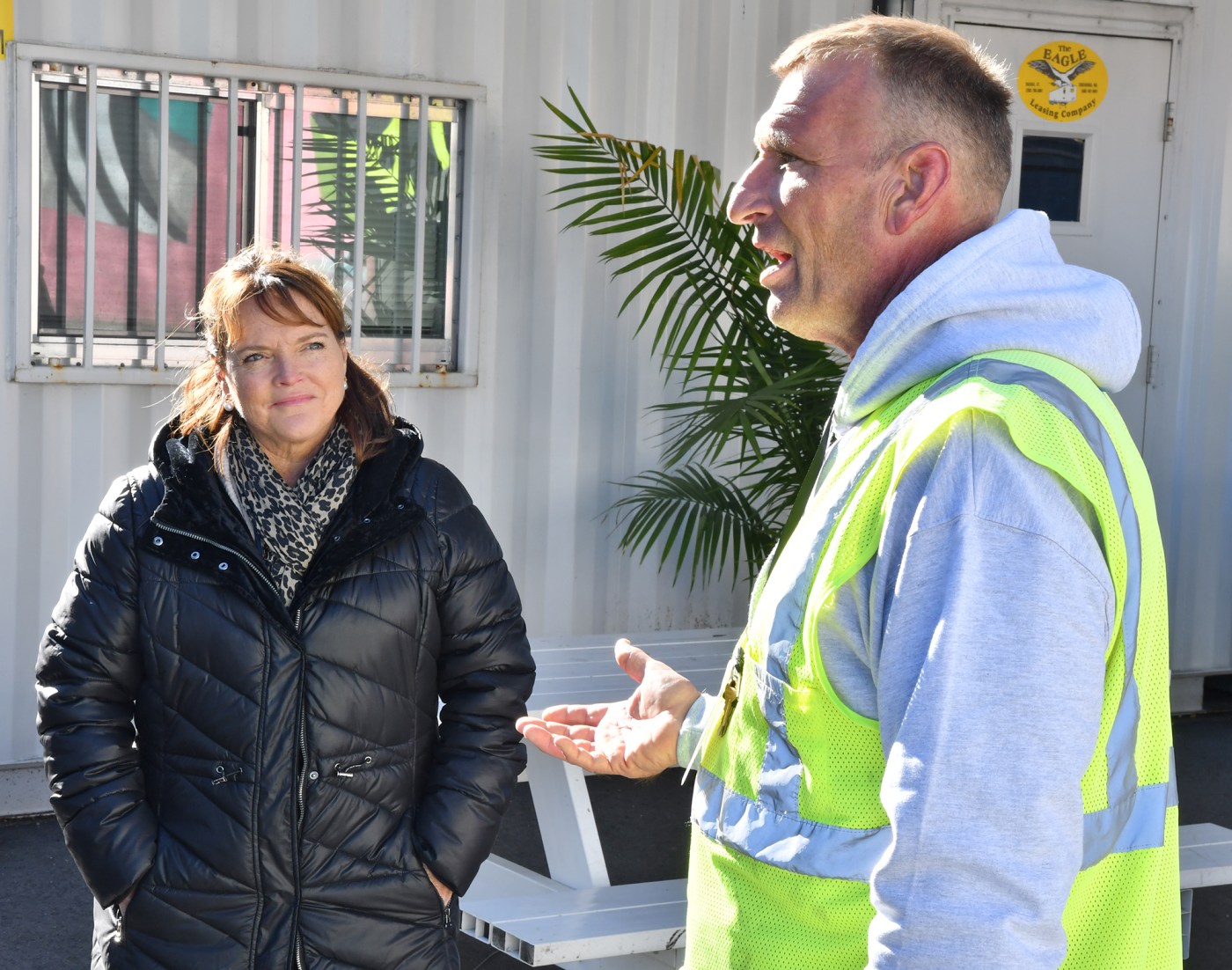
Life after Mass and Cass: Ex-Homeless talk ‘Opportunity’
When the tents came down Nov. 1 on Atkinson Street, the heart of the Mass and Cass encampment, the most visible workers on the street were wearing yellow vests.
Those workers taking down the tents and carting out tons of refuse from the streets were formerly homeless or substance abusers themselves, many of whom had once lived in the encampment.
So far, some 120 of them have been given a fresh start in the Newmarket Business Improvement District’s Homeless Back2Work program, with 40 of those moving on to full-time employment and most of them finding more permanent housing.
The Business Improvement District replaced the Newmarket Business Association — a kind of chamber of commerce-type organization for the businesses in the area that the encampment would come to define — in January 2022.
The new organization was formed to, as Executive Director Sue Sullivan explained to the Herald, “perform functions that are over and above what the city can do. So when all the property owners say we need more, that’s what we do.”
A “trifecta” of issues, Sullivan said, beginning with the opening of the first methadone clinic in the area in 2006 and then compounded by an explosion of fentanyl usage in 2013 and the closing of the bridge to Long Island, which housed an addiction recovery campus administered by the city’s Public Health Commission, in 2014 led to the Newmarket area becoming the Mass and Cass morass.
Getting stuck
And for various reasons, many got stuck there and didn’t see a way out.
“Before this, I was not in the best place. I was living in a tent here, and it was kind of my bottom, worst place in my life,” Frank Kassle, a worker in the program told the Herald. “I was in tents when this whole block was tent city pretty much. You couldn’t come down here without tripping on a needle or a tent.”
Like others who found themselves living in the area known by some as “Methadone Mile,” addiction was a big reason Kassle found himself there. But not too long before, he had a home with his family in Mattapan but the bank foreclosed on it in 2020.
The changes came quickly. He and his family, including his now-fiancee, lost the house. In the next year he was both delivering pizzas and living out of his car — until that broke down, and he found himself by the end of the year in a tent and suffering from addiction.
Crystal Hinson, 41, said “I’ve never worked a day in my life. I’ve always been in the streets getting some type of fast money and that led to me being incarcerated.”
Her mother died and so she said she “packed my own bags at 11 and told the judge, I’m not going home with this man,” meaning her father. She was in and out of foster homes and introduced to heroin at an early age.
Life as an adult with that background left her few options to get by; she sold drugs, used drugs, scrimped to pay for apartments but had to float around often through her life.
While she never lived in a tent, she said “everybody has their own” rock bottom.
Hinson’s from Cape Cod, and she doesn’t want to go back because of the temptations that lie in the life she left for herself there. It’s a similar story for Kurt Kaski, who let four and a half years of sobriety slip when he returned home to the Cape and couldn’t maintain it when surrounded by his old crew.
John Harrington, who used to be a sous chef, said that he was being bullied at the restaurant and couldn’t stand working there another day and so he left and went looking for other work, but his record held him back and he ended up homeless by July of this year.
“I’ve been through some rough times in my life as far as imprisonment, as far as doing the wrong thing,” he said. “I’ve changed over the years. So I did my time and I’m trying to repurpose myself to be greater for society, you know what I mean? So that’s what I’m trying to do.”
The program’s director, Carol Costello, said that “honestly, it’s going to sound corny, but I feel like I’m doing God’s work and getting paid for it.”
She said “this street was pure evil” and that it wasn’t a homelessness issue, but a staging ground for dealers and predators that brought in even more complications, misery and extreme violence to the vulnerable people living there.
Getting to work
When the Herald asked what was most needed for people lost in the streets to make a turn in their life, everyone chimed in with one word: “opportunity.”
Costello, the program director, said that to be able to give opportunity, and “to show love and kindness, I think that’s a huge key to being out here and doing the work that we do. We wouldn’t be able to do it without those qualities.”
Sullivan, the executive director, was walking through the neighborhood and saw “trash all over the place.”
So she went up to some people shooting up in a gas station down the street and asked if they would help to clean if she got them some trash bags. They were enthusiastic, she said. She provided them bags, gloves and a bucket. Two hours later, in the middle of a 95-degree day, the group — led by a man she remembered went by “Rambo” — had picked up 15 bags of trash and had filled the bucket with needles. She gave them each $10 each.
Then it happened again, and Rambo was even asking for more work and getting others involved. She found eight other cities had done similar programs municipally and so she got it working in Boston. The workers make $20 an hour now, though most work for only a few hours at a time.
But joining the program, the workers told the Herald, was more than the money. It was also guidance on how to navigate the complex, bureaucratic world of getting life’s basics out of the way that tests even those not living on the streets. That involves getting housing with bad or no credit, getting IDs once they get an address, getting drivers licenses and finding jobs that would be willing to hire people with criminal records.
And each counts as a bit of good fortune that allows those who embrace it to get back to the things they cared about before. For some, like Harrington and Kaski — who has become an ordained minister recently and is trying to start his own organization called ADAPT, or “Attack Disease and Poverty Together” — the opportunity to move forward has bolstered their faith and opened up room to help pull up others.
Looking forward
For those who spoke with the Herald, there were a lot of hopes for a better future.
While Hinson said she doesn’t want to “graduate” from the program as a friend had done because she’s happy with this work, she said that’s a choice because “If you are doing what you need to do and putting your effort in, it’s really up to you.”
She said she has reams of 5-Star notebooks she’s filled with her life stories, and hopes to turn them into a book.
Harrington would like to work again as a chef — “when you’re cooking, it’s for people. And I like to make people smile.” — and also boasts certifications in swim school instruction and forklift operation.
Kassle said he found himself in a “survival mode,” thinking “day to day, you don’t even think about the future.”
Now, he said, he’s “trying to think about the future by trying not to look back” and believes he’s reached a “post-survival state.” He’s looking toward trucking as a career.
“I wanted to hit the road and really just see the rest of the country in a way where I actually make money doing it,” he said, adding that he’d like to see it with his fiancee, who he’s been with for 16 years. “Our commitment got stronger once we went through all this. Since we’ve been through the mud together, we figured we could shine on the other side.”
Formerly living on Atkinson Street, Frank Kassle talks about his experiences. (Chris Christo/Boston Herald)
Crystal Hinson talks about having her first real job. (Chris Christo/Boston Herald)
Isaiah Serrano talks about the circumstances that brought him to Boston. (Chris Christo/Boston Herald)
Sue Sullivan of the Newmarket Business Improvement District . (Chris Christo/Boston Herald)
John Harrington talks about his life experiences. (Chris Christo/Boston Herald)


